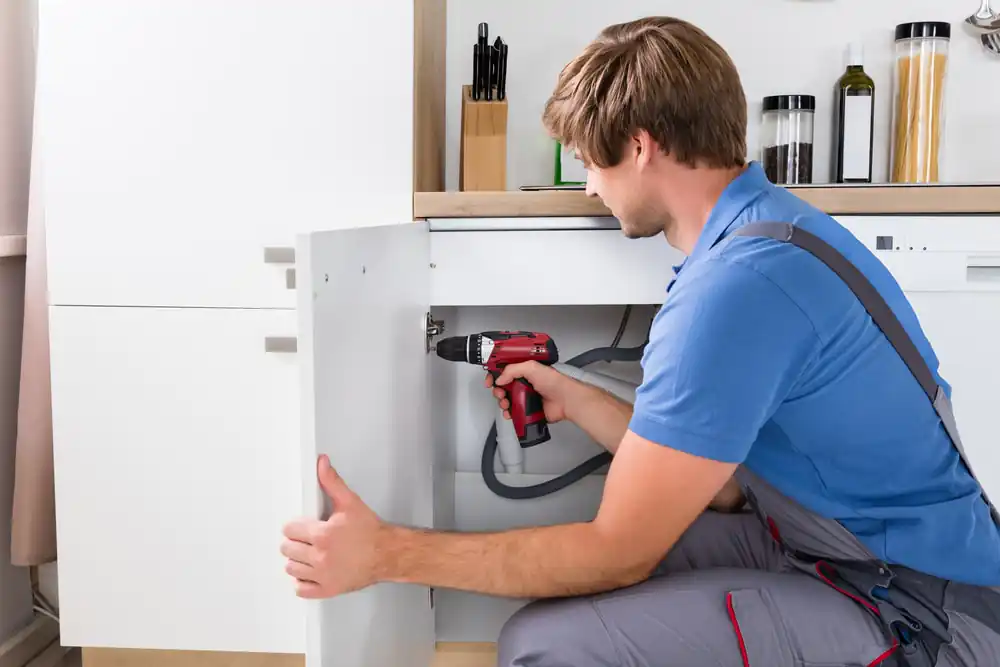Nebraska
License required: Yes (state contractor registration required for construction work)
You can work as a handyman in Nebraska without a state license. However, you will need to register with the Nebraska Department of Labor. This requirement applies to all general contractors, subcontractors or people who perform construction, alterations, renovations, additions, installations or repairs.
Required business insurance in Nebraska:
- Nebraska requires workers’ compensation if you have any employees.
- If you drive for work-related tasks, you may need commercial auto coverage. Nebraska’s minimum motor vehicle requirements are $25,000 per person / $50,000 per accident / $25,000 property damage.
Nevada
License required: Yes (license required over $1,000 or if a permit is required)
Nevada requires a contractor license for any job worth more than $1,000 or any work that requires a building permit. Work under $1,000 that doesn’t require a permit falls under Nevada’s limited handyman exemption.
To be eligible for a license, you’ll need to show the Nevada Contractors Board four years of work experience as a journeyman, foreman, supervising employee or contractor. Up to three years of experience can be substituted for years of education at an approved college. You’ll need to pass a trade exam and a business and law exam and show proof of insurance.
Required business insurance in Nevada:
- Nevada requires workers’ compensation if you have any employees.
- If you drive for work-related tasks, you may need commercial auto coverage. Nevada’s minimum motor vehicle requirements are $25,000 per person / $50,000 per accident / $20,000 property damage.
Learn more about handyman license and insurance requirements in Nevada.
New Hampshire
License required: No
Handypersons are not required to have a state license to work in New Hampshire, which only licenses those who perform electrical, plumbing or asbestos abatement work.
Required business insurance in New Hampshire:
- New Hampshire requires workers’ compensation if you have one or more employees.
- If you drive for work-related tasks, you may need commercial auto coverage. New Hampshire’s minimum motor vehicle requirements are $25,000 per person / $50,000 per accident / $25,000 property damage.
New Jersey
License required: Yes (registration required)
New Jersey law requires Home Improvement Contractor (HIC) registration with the New Jersey Division of Consumer Affairs for anyone doing residential repair or home improvement work for compensation. You must submit proof of general liability coverage with your application.
Required business insurance in New Jersey:
- Home improvement contractors must have general liability insurance of not less than $500,000 per occurrence.
- New Jersey requires workers’ compensation if you have any employees.
- If you drive for work-related tasks, you may need commercial auto coverage. New Jersey’s minimum motor vehicle requirements are $15,000 per person / $30,000 per accident / $5,000 property damage.
Learn more about handyman license and insurance requirements in New Jersey.
New Mexico
License required: Yes (handyman certificate ≤ $7,200; contractor license required above that)
New Mexico requires either a handyman certificate for very small repair work (earning up to $7,200 per year) or a contractor license for larger or more complex projects.
Those who earn more or work on major repairs and renovations must have a GB-2 Residential or GB-98 General Building contractor license issued by the Construction Industries Division of the New Mexico Regulation and Licensing Department.
The residential classification requires two years of experience, and the general building classification requires four years of experience. You must also pass a trade exam and a business and law exam, provide proof of a $10,000 bond and obtain New Mexico workers’ compensation insurance.
Required business insurance in New Mexico:
- New Mexico requires workers’ compensation if you have three or more employees.
- If you drive for work-related tasks, you may need commercial auto coverage. New Mexico’s minimum motor vehicle requirements are $25,000 per person / $50,000 per accident / $10,000 property damage.
Learn more about handyman license and insurance requirements in New Mexico.
New York
License required: No
New York does not have a state handyman license, but many cities and counties — including New York City, Long Island, Buffalo, and Westchester County — require home improvement licensing.
Required business insurance in New York:
- New York requires workers’ compensation if you have any employees.
- If you drive for work-related tasks, you may need commercial auto coverage. New York’s minimum motor vehicle requirements are $25,000 per person / $50,000 per accident / $10,000 property damage.
North Carolina
License required: No
A handyman doesn’t need a state license in North Carolina. If the value of your work projects exceeds $30,000, however, you must have a general contractor license issued by the North Carolina Licensing Board for General Contractors. To apply, you must meet the financial requirements and pass an exam.
Required business insurance in North Carolina:
- North Carolina requires workers’ compensation if you have three or more employees.
- If you drive for work-related tasks, you may need commercial auto coverage. North Carolina’s minimum motor vehicle requirements are $30,000 per person / $60,000 per accident / $25,000 property damage.
Learn more about handyman license and insurance requirements in North Carolina.
North Dakota
License required: Yes (contractor license required over $4,000)
North Dakota requires a contractor license for any job worth more than $4,000, including construction, repairs and alterations. It is awarded by the Secretary of State of North Dakota.
There are four classes of licenses based on the size of the jobs you plan to work on.
Required business insurance in North Dakota:
Ohio
License required: No
Ohio does not require a state handyman or general contractor license, but trade work such as electrical, plumbing, HVAC, hydronics and refrigeration requires a state specialty license. You must have a specialty contractor license issued by the Ohio Construction Industry Licensing Board.
Licensing requirements include a background check, passing scores on two exams and $500,000 in liability insurance coverage.
Required business insurance in Ohio:
- Ohio requires workers’ compensation if you have any employees, purchased through a state agency.
- If you drive for work-related tasks, you may need commercial auto coverage. Ohio’s minimum motor vehicle requirements are $25,000 per person / $50,000 per accident / $25,000 property damage.
Learn more about handyman license and insurance requirements in Ohio.
Oklahoma
License required: No
Oklahoma does not require a state handyman license, but trade work like electrical, plumbing, or HVAC requires a state license, and some cities require general contractor registration.
Required business insurance in Oklahoma:
- Oklahoma requires workers’ compensation if you have five or more employees.
- If you drive for work-related tasks, you may need commercial auto coverage. Oklahoma’s minimum motor vehicle requirements are $25,000 per person / $50,000 per accident / $25,000 property damage.
Oregon
License required: Yes
Oregon requires a state contractor license for nearly all paid construction or home improvement work. The Oregon Construction Contractors Board’s “casual, minor work” exemption under $1,000 applies only in very limited cases and does not cover most handyman services.
You’ll need to pass pre-license training and pass a test, and show proof of Oregon general liability and workers’ compensation insurance.
Required business insurance in Oregon:
- Licensed contractors must have general liability insurance. The coverage amount varies based on the endorsement—typically $100,000 per occurrence.
- Oregon requires workers’ compensation if you have any employees.
- If you drive for work-related tasks, you may need commercial auto coverage. Oregon’s minimum motor vehicle requirements are $25,000 per person / $50,000 per accident / $20,000 property damage.
Learn more about handyman license and insurance requirements in Oregon.
Pennsylvania
License required: Yes (Home Improvement Contractor registration required if earning >$5,000/year)
You do not need a state license to work as a handyman in Pennsylvania. However, if you do more than $5,000 worth of home improvement work per year, you must register with the Attorney General’s Office.
Required business insurance in Pennsylvania:
- Pennsylvania requires workers’ compensation if you have any employees.
- If you drive for work-related tasks, you may need commercial auto coverage. Pennsylvania’s minimum motor vehicle requirements are $15,000 per person / $30,000 per accident / $5,000 property damage.
Rhode Island
License required: Yes (registration required)
As a handyman, you won’t need a license to work in Rhode Island. However, if you work on construction, alterations, remodeling or repair projects at residential properties, you’ll need to register with the State of Rhode Island Contractors’ Registration and Licensing Board.
Required business insurance in Rhode Island:
- RI requires workers’ compensation if you have one or more employees.
- If you drive for work-related tasks, you may need commercial auto coverage. Rhode Island’s minimum motor vehicle requirements are $25,000 per person / $50,000 per accident / $25,000 property damage.











